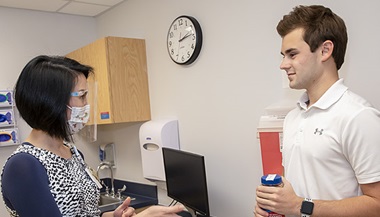Patient Story
Allergies and Immunodeficiency: Erik's Story

Five-year-old Erik loves to play soccer outside with his family, and especially with his little brother, Carlton, 4. It wasn’t until last year though, that Erik finally started breaking out of his shell, attending school and playing outdoors like any other 5-year-old. Erik’s mother, Delquanda Turner Smith, says since he was born, it has been a roller coaster of health care mysteries. A combination of food and environmental allergies mixed with common day care illnesses made the first few years of Erik’s life quite difficult.
“Erik was a little fussy as a baby, had rashes and a lot of projectile vomiting. … He also had multiple ear and sinus infections while attending day care,” recalls Turner Smith. “He even got ear tubes and ended up having his adenoids and tonsils out at a year old, but he kept getting sinus infections and ear infections.”
A pediatric specialist recommended allergy testing and blood work. Eventually, experts confirmed Erik should avoid dairy, egg, soy, tree nuts, wheat, oak pollen and animal dander — just to name a few of his allergens. His blood work also showed he had low MBL (mannose-binding lectin) levels, pointing to an immunodeficiency that meant his immune system was having a hard time fighting off infections.
“He will keep going and going the best he can, but you can see it in his eyes. … He’s in pain,” says Turner Smith.
Dad, Erik C. Smith, agrees, “He's a tough kid that really wants to be a kid. He is the type that will suffer in silence, however.”
As if a long list of allergies, asthma and common colds weren’t enough for the family, then the pandemic hit.
“We became a bubble family — no one came in, no one went out — we couldn’t risk it, and being that Erik’s immune system is so weak, we couldn’t take that risk,” adds Turner Smith.
Erik’s family members were cautious during this time, but they also knew they needed to keep searching for answers and started researching immunologists, coming across Jolan Walter, M.D., Ph.D., division chief of the USF Pediatric Allergy/Immunology Program at Johns Hopkins All Children’s Hospital.
“What is interesting in his story is he has a lot of pieces of the puzzle, and we have to find out where we want to go in treating him — with food allergies, environmental allergies, asthma,” Walter says. “But then there is this other part with the immunodeficiency, and how much of this immunodeficiency comes from antibody problems or how much of it is coming from the MBL deficiency? So, there is a whole list of different pockets that we have to evaluate and repeatedly test through life.”
Walter and her team dug deeper into Erik’s medical history, finding that his vaccine titers were also low. This meant many common vaccines Erik received as a baby, such as pneumococcal shots, weren’t holding as they should to protect his immune system, confirming his immune system wasn’t working as it should.
Juan Dumois, M.D., a pediatric infectious disease physician at Johns Hopkins All Children’s, was the family’s next stop for answers.
“The immune system is a very complicated mechanism for defending us against infections and viruses,” Dumois says. “We often do testing with kids with recurrent infections, and the majority of their immune work up comes back totally normal, but they may continue to be sick, often due to being in day care or having allergies. … Erik had all of this, plus the immunodeficiency.”
Dumois started Erik on a rotation of two different antibiotics, and alternating those out every two weeks in hopes of decreasing the infections over time and having the bacterial infections become resistant. Erik will be evaluated every six months to check if the strategy is working until he builds up his immune system.
While the antibiotic regiment seems to be working now, there are still more answers the family and medical experts will search for. Walter says there are currently 585 immune gene panels available and that may be the next step to solving Erik’s medical puzzle. However, she suggests families with complicated medical journeys like Erik’s to keep an open mind and continue their search for answers.
“I want to encourage parents to be curious-minded and ask questions,” Walter says. “Think about what is the priority for the child — we want to keep them safe and grow and we don’t want to hold them back because of infections. What matters to me is the patient’s quality of life and how they can live. We may not have the answer for everything right away, but we can try our best to keep them safe and grow up.”
Erik’s mom agrees. “I’m following a mother’s intuition and advocating for my child. We’ve got to keep pushing while we have all the medical professional’s attention. Many days I’ve cried over this, but this is my baby and I have to keep searching for answers.”





